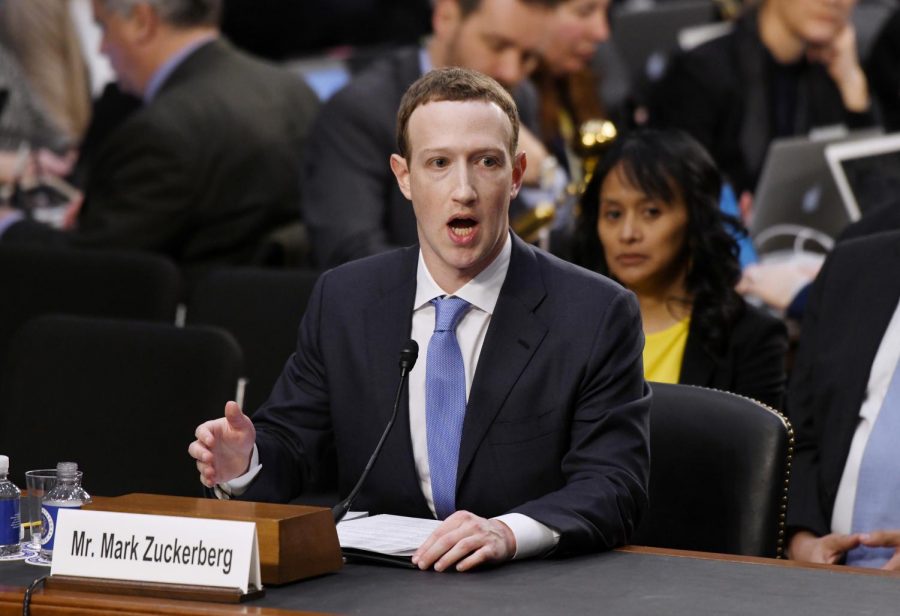Moving forward from the Zuckerberg testimony
Photo courtesy of Tribune News Network
Facebook CEO Mark Zuckerberg testifies before the Senate judiciary and commerce committees on Capitol Hill over social media data breach on April 10 in Washington, D.C. A new film by a University professor analyzes Zuckerberg’s changing public persona.
Apr 12, 2018
Following the thousands of complaints about Facebook’s misappropriation of user information, CEO Mark Zuckerberg testified on Capitol Hill on Tuesday to answer questions from higher government authorities.
Facebook is founded on the idea of sharing data, which can consist of pictures, likes or locations. However, the company dropped the ball and illegally transferred millions of users’ personal information to political consulting firm Cambridge Analytica. This has caused the government and users alike to call Facebook’s entire presence as a social media platform into question.
Zuckerberg took part in two hearings Tuesday afternoon to pass along as much information regarding the interaction between Facebook and Cambridge Analytica as possible. He also answered questions from lawmakers in an attempt to clear the air around the investigation.
Facebook will apologize, and we are sure to see various marketing campaigns in an attempt to restore its former glory. However, as users of the platform who generate revenue for the company, it’s appropriate to question whether we can really trust the company moving forward.
For all we know, Facebook may be only one of many social media companies have sold or shared private user information without permission.
Get The Daily Illini in your inbox!
The next steps aren’t clear, but one can surely start by limiting the actual usage of social media apps.
Facebook allows a user to do various things like sharing articles, posting pictures and even shopping. Some of the features require more personal info than others; pictures, once posted, can potentially remain in the enormous cloud of internet data forever.
The conflict arises in what is fair and what isn’t. Facebook mishandling that data isn’t fair, but neither is advice to stop posting pictures on the site. After all, the point of using such platforms is to share this type of information, albeit with select friends and family members.
Regardless of what users choose to do, those who continue to participate on these social media sites should always do so with caution.
About a year ago, a new usage of the photo-sharing platform Instagram was introduced. On top of regular accounts, many users created what is called a “finsta,” or “fake Instagram.” These accounts are used to post more personal or private images and information users aren’t comfortable sharing on their original accounts.
From personal experiences, many finstas I’ve seen are filled with detailed, drunken escapades and whatnot. Essentially, they are used to showcase risque behavior you really wouldn’t want parents to know about.
But even if the account is private, there’s no telling who can view your information. The site has access to your data and can do with it whatever it pleases, as evidenced by the Facebook-Cambridge Analytica debacle. This experience makes it clear there is no way for the average user to be completely confident in any platform’s privacy.
Whatever you put online will stay there, whether you like it or not. And with the power many of these social media companies hold, they aren’t likely to provide you answers.
In a certain exchange between Senator Lindsey Graham and Zuckerberg, Graham asked if the CEO felt that Facebook has become a monopoly. Zuckerberg’s direct response was, “It certainly doesn’t feel like that to me.”
The response brought laughter, and for good reason. Graham put it this way: If a person is unhappy driving a Ford … he can go out and buy a Chevy instead. If a person is unhappy with Facebook, then what is the alternative?
The short answer is there really is none. Facebook also owns Instagram and WhatsApp, two of the most largely used social media apps in the world. There isn’t a place on the internet Facebook doesn’t touch with the many companies it has acquired.
There is no going back on our activity on social media sites, but there is certainly room for improvement regarding the security and infrastructure these companies provide. We can no longer take what they tell us to heart because there is little room for trust.
All we can do now is be smarter about how the products we use have become so integrated into our lives.
Saketh is a sophomore in LAS.






